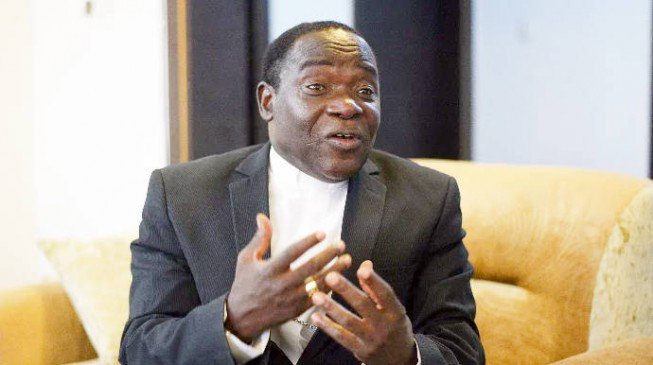
The Catholic Bishop of Sokoto Diocese, Dr. Matthew Hassan Kukah, has said that no President of any country in the world can be as irresponsible in the usage of power as a Nigerian president.
He made this known in Akure, Ondo State on Friday while delivering the annual Ulefunta/Oyemekun Festival lecture entitled “Building blocks for a good society” held at the Francis Idibiye Lecture hall of the Federal University of Technology, Akure (FUTA).
According to Kukah, the structure of the Nigerian presidential office makes the holders of the office extremely powerful, so much that he can deploy power the way he wants.
“No president in the world has the kind of power the Nigerian president has and as such, no president in the world can be as irresponsible as the Nigerian president. His power is so much that he can give oil bloc to his girlfriend and many others. You thus can’t be a man of honour and live in a country like Nigeria and not be angry,” he said.
Kukah said that from the first Nigerian Prime Minister, Alhaji Tafawa Balewa to President Muhammadu Buhari, virtually all of them were dragged into the presidential office, maintaining that this was unlike the presidency of the United States of America where the president does not emerge by circumstance.
“What is the problem? It is the dilemma of leadership. In America, there are basic expectations of what a president should be. For instance, he must have gone through Harvard as an institution, he must have language and track records, not even wealth. You can’t surprise the system.
Here in Nigeria, local government chairman wants to be governor; the governor wants to be president and the president doesn’t want to go! Many states have two governors representing them at the National Assembly. Governors have control and monopoly of resources of state and they use same resources to oppress them,” he said.
Kukah, who said that the Nigerian society is in ferment, maintained that the instability type that Nigeria faces as a country is inevitable in any system.
He, however, said that developing mechanisms that will confront the instability is the hallmark of great countries.
In Nigeria, it is not a question of looking for trouble because trouble is already here. The Nigerian state has no capacity to protect itself and there is no loyalty to Nigeria from its citizens but to those who help individuals to get to positions in the system,” he said.
Kukah, however, singled two former Nigerian leaders out of the leadership rot, Chief Obafemi Awolowo and Alhaji Aminu Kano, whom he called “architects of a good society.”
“Awolowo, for his major quintessential evidence as somebody who already figured out what he would do with power if he got it. He understood the building blocks for an egalitarian society. Aminu Kano single handedly took on the feudal class in Northern society and had a deep understanding of society, even as he textually talked about a free society in a way and manner that didn’t offend religion,” he said.
While stating that it is not enough for a people to have the building blocks of a good society alone, Kukah also maintained that Nigeria has not been able to build a good society because the country has not obeyed the rules of design.
“We have to understand the building blocks of society which is not too different from the rules of building a house. A good society is not different from the building blocks of society. When a building collapses, it didn’t collapse in a day. It began to collapse a long time ago. For us to build a good society, we have to have eyes that monitor the needs, growth and development and feelings of that society. Then you can be sure of the quality of that society,” he said.
While reviewing the lecture, Professor Kole Omotoso, lauded Kukah for what he called a very profound lecture and said that the only point of departure he had in the lecture was Kukah’s submission that education has the potential to remedy the problems of Nigeria’s existence.
Guests at the occasion included the Deji of Akure, Oba Aladetoyinbo Aladelusi, Chief Reuben Fasoranti, the chairman of the occasion, and many others.